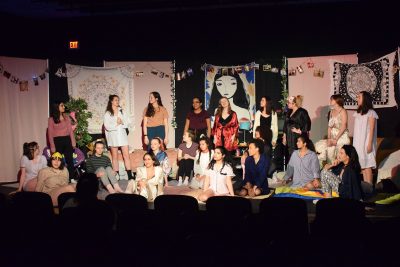One way to make a subject less taboo is to perform a series of monologues about it, and that’s exactly what “The Vagina Monologues” is meant to do.

VAGMO+, an inclusive feminist group on campus, is putting on their yearly production of “The Vagina Monologues” this weekend, Thursday through Saturday. The play features a series of monologues performed by club members to portray the female experience.
The play, written by Eve Ensler in 1996, is told through the eyes of multiple different women of different backgrounds and experiences. Topics include the vagina itself, genital mutilation, menstruation, sexual pleasure, sex work and birth.
Bruna D’Amore Giampietro, co-director with Christina Bissereth and senior in the College of Communication, said VAGMO+ doesn’t think of itself as a theater group.
“I don’t really know anything about theater, but I am the director. For us, it’s a lot more about passion and activism than acting,” Giampietro said. “At the end of the day we’re not acting the experiences that are all being performed on stage. We’re just channeling the message through another person’s voice.”
Performer Olivia Pastore, a senior in the College of Arts and Sciences, said she believes the monologues go beyond entertainment, but that they can teach, inspire and spread positivity.
“It’s educating a lot of people,” Pastore said before the dress rehearsal on Wednesday. “It’s educating men who maybe have no idea about anything about the female anatomy. It’s educating women on how to feel more comfortable and being yourself.”
After many years of putting on the production, “The Vagina Monologues” became a more inclusive and expansive club, now called VAGMO+. The club is now involved on campus both semesters and puts on two productions in the spring.
Co-producer Emily Macdonald, a senior in CAS, is involved in the marketing and ticket sales for the show. She said she thinks the switch to a full-time club changed what “The Vagina Monologues” was able to do on campus.
“We’re definitely creating more partnerships with other clubs and very impactful organizations that also work with self-identifying women,” Macdonald said. “I feel like we’re making more of an impact and also, because of that, our audience is a lot larger.”
Performer Gabby Florio, a senior in CAS, said she thinks the new club status continues the push to end the stigma surrounding discussion of explicit topics, as does the production “Yoni Ki Baat.”
“It’s a great expansion,” Florio said. “I think it’s a continuation of the conversation. It gives better opportunity for people that want to be a part of this community more than anything.”
“Yoni Ki Baat,” which translates from Hindi to “Vagina Talk,” is loosely based on the monologues, but is by women of South Asian origin.
The YKB show in March will widen the scope of the monologues, Giampietro said, to cover the inclusivity that is missing from “The Vagina Monologues.”
“[Yoni Ki Baat] attempts to create a platform for women of color, queer women and non-binary folks, for them to share their own experiences with intersectionality,” Giampietro said. “It’s a bit like spoken word or storytelling, but it’s really important because it adds another dimension and the intersectional lens that ‘The Vagina Monologues’ too often lacks.”
“The Vagina Monologues” is popular among students on college campuses across the United States, and BU is no exception — this year, every showtime is sold out as of just before the group’s Wednesday evening “soft show.”
All of the proceeds from the shows are going to Women’s Lunch Place, a nonprofit focused on helping homeless women in Boston, and the Freedom Through the Arts Collective, a nonprofit which helps incarcerated artists share their work, according to Giampietro.
For many of the performers, “The Vagina Monologues” is about empowering themselves, other women and changing the conversation around vaginas.
Andrea Wetzler, a freshman in CAS and performer in the show, said the show opens up a discussion for a natural topic many find too taboo to talk about.
“It’s really about how stigmatized vaginas are in our culture, and the kind of hatred and the kind of derogatory terms that surround 50 percent of the world’s population’s genitalia,” Wetzler said. “Being able to say the word and repeat it and have an audience laugh and cry with it makes it come into the open.”





















































































































